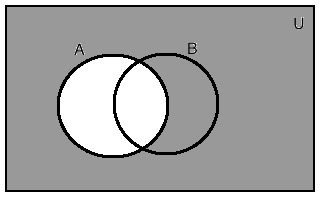Plans
Dashboard
Daily & Speed
Quant
Verbal
DILR
Compete
Free Stuff
Set Theory
MODULES
CONCEPTS & CHEATSHEET
SPEED CONCEPTS
PRACTICE
| Union of sets: Union of two sets A and B is the set containing all elements of set A or set B or both. This is denoted as A ∪ B. |  |
| Intersection of sets: Intersection of two sets A and B is the set containing all elements that are in both set A and set B. This is denoted as A ∩ B. |  |
| Difference in sets: Difference of sets A and is the set containing all elements of set A that are not in set B. This is denoted as A - B. |
 |
| Complement of Sets: If A is set that is a subset of a universal set U (A ⊆ U), then the complement of A is a set containing all elements in U that are not in A. A' or Ac is used to denote the complement of a set A. |  |
| Disjoint Sets: Disjoint sets are sets which do not have any element common between them. A ∩ B =ϕ. |  |
| Type | Laws |
|---|---|
| Identity Law | A ∪ ϕ= A A ∩ = A |
| Commutative Law | A ∪ B = B ∪ A A ∩ B = B ∩ A |
| Associative Law | A ∪ (B ∪ C) = (A ∪ B) ∪ C A ∩ (B ∩ C) = (A ∩ B) ∩ C |
| Distributive Law | A ∪ (B ∩ C) = (A ∪ B) ∩ (A ∪ C) A ∩ (B ∪ C) = (A ∩ B) ∪ (A ∩ C) |
| De-Morgan's Law | (A ∪ B)' = A' ∩ B' (A ∩ B)' = A' ∪ B' |
Want to read the full content
Unlock this content & enjoy all the features of the platform
Subscribe Now